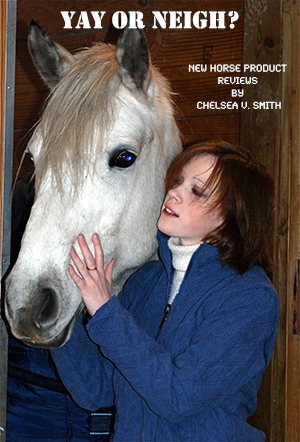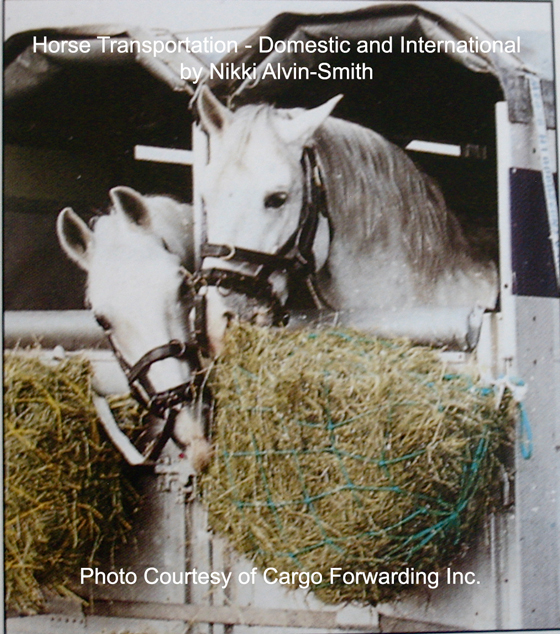The Insider’s Look at Horse Transport
by Nikki Alvin-Smith
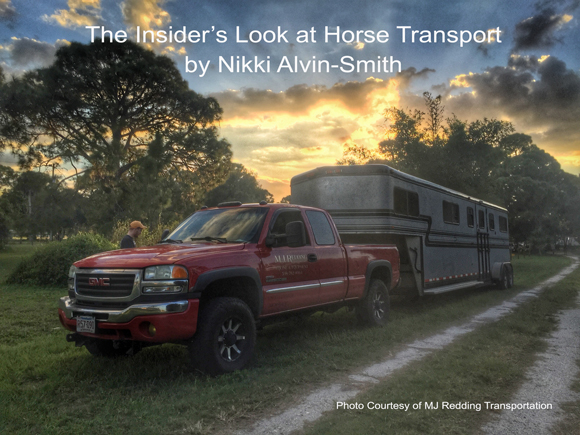
At some time or another most horse owners entrust their valuable equine partner to the care of a professional horse transport company. And with ever changing laws pertaining to licensing of truckers ( or shippers as some people refer to them), it is hard to keep up with what a horse owner should look for and what they should expect and demand from the professional and how to choose the best one.
It is also important to understand what truckers need from the horse owner and what the best way is to prepare your horse for his journey.
Here is some perspective from two professionals that will give us ‘The Insider’s Look’.
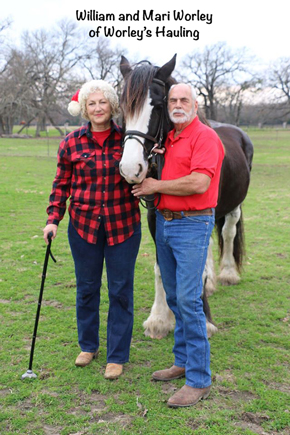 Mari Worley of Worley’s Hauling, has been in the horse transport business full time with her husband William, for seventeen years Their operation is based out of Corsicana, TX and they offer nationwide service, with most requests for service being East to West rather than North to South. Mari explained they once covered Alaska and Canada too. In addition to horse transport Worley’s also offers transport for exotic species. Adding a little spice to life can’t be bad!
Mari Worley of Worley’s Hauling, has been in the horse transport business full time with her husband William, for seventeen years Their operation is based out of Corsicana, TX and they offer nationwide service, with most requests for service being East to West rather than North to South. Mari explained they once covered Alaska and Canada too. In addition to horse transport Worley’s also offers transport for exotic species. Adding a little spice to life can’t be bad!
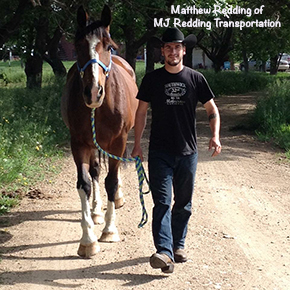
Matthew Redding is the owner of MJ Redding Transportation based in Hopkinson, MA and the main routes operated are Boston, MA to Florida, Boston, MA to Lexington, KY and Boston to the West Coast.
Here’s a look at our Q and A’s posed to both and their advice.
CH:
What is the most important/helpful thing a horse owner can do for you when having a horse ready for transport?
Mari Worley:
There is no one thing that is more important. It is all important. Be FLEXIBLE. Although we strive to be on time there are many factors that affect transport such as traffic, road conditions, weather, mechanical problems or issues with the horses. If you have chosen a good transport company they will communicate with you when there are issues or delays.
Have the paperwork ready to go (current Coggins and Health Certificate, brand certificate if required, registration or sale paperwork if sending it with the hauler) and in an envelope labeled with the horse’s name and owner’s name. Clearly label anything you are sending with the horse such as a tack box, blanket, saddle etc. Provide written feed or medication instructions. Provide detailed directions as GPS is often not accurate in rural areas or there may be local road closures or roads that are not appropriate for a long rig. GPS is providing directions for a car. It would be helpful to provide visual clues, street names, difficult/tricky turns, steep climbs, mileage, property/house description, access and parking instructions, etc. Remember that the driver may arrive at night so visual clues must fall within headlight range. Colors are difficult to see at night.
Ask the hauler the length of the rig. The driver will need appropriate turn around room. Please advise if there may be a problem making a turnaround on site or if the driver might need to back down the driveway or load/unload on the road. Most commercial trucks and trailers also needs a minimum of 10’ of ground clearance. Please check your drive for branches and low hanging wire lines.
Matthew Redding:
Have the paperwork ready to go! Coggins and Health Certificate both up to date.
CH:
What is the number one mistake people make when having a horse ready for transport?
Mari Worley:
We don’t usually have a problem with this as we try to educate the owners about the issues previously mentioned to avoid problems after we have arrived and it’s too late to fix.
Matthew Redding:
Not familiarizing the horse with loading and unloading.
CH: Do you run straight through or do layovers on long runs?
Mari Worley:
We layover each night for ten hours at horse motels, fairgrounds or private farms that we are familiar with. It is important to rest both the horses and the drivers each night and it is also safer to drive in the daylight. There are situations when we may prefer to drive at night due to heat, however, we would still layover each day for ten hours.
Matthew Redding:
Both, depends on needs of horse and wants of owners.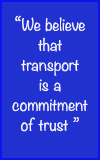
CH: How do you handle transport of stallions? When you have one on board, more than one or have mares on board also?
Mari Worley:
Our trailer as a seventh stall that is totally separate from the main trailer with its own entrance that is perfect for stallions. The main trailer also has head shields and floor to ceiling dividers to prevent interaction between the horses if needed. It would be rare to have multiple stallions on the same trip unless they belonged to the same owner but the same precautions would apply that we would take with any other horse on the trailer. We would also be more selective about the remaining horses on the trailer and would prefer not to have mares on a trip with more than one stallion. We have often had a stallion on the trailer at the same time as a mare. It really depends on the individual horses and a careful interview of all owners before booking horses can alleviate most problems before they occur.
Matthew Redding:
Carefully. In their own box stalls away from other horses. {We use} a stallion stall
CH:
Do you deliver for export? If so what procedures are involved and what can the horse owner do to make it go more smoothly?
Mari Worley:
Each facility that offers export or quarantine has different procedures and requirements depending on the country the horse is going and we follow their requirements. Sometimes there are no additional requirements because the horse must be in quarantine prior to shipping so it is all done at the quarantine facility. Other time, transport may be in a sealed trailer. The horse owner should select an export company they are comfortable with and follow their recommendations to prepare the horse.
Matthew Redding:
We have not handled horses for export.
CH:
To wrap or not to wrap? What is your opinion?
Matthew Redding:
No. Shipping boots on longer than 1 day trips, but I don't find wraps to be necessary, and not safe for multiple days on the trailer.
Mari Worley:
Once again, this all depends on the horse and the type of trailer it is riding in. In most cases, wraps are not needed for long distance transport because they can either get too loose or too tight in a few hours and aggravate the horse which may cause more damage than the reason they were put on in the first place which is to protect the legs. If a horse is not used to wearing wraps we would not recommend trying something new when you are already putting them in a stressful situation being in a strange trailer with strange people. If the horse is used to wearing wraps and the trailer does not have dividers to the floor (unlike ours) wraps may prevent injury. In all cases, while we typically do not recommend wraps, we would defer to the owner and if they put wraps on the horse can ride with them.
CH:
To blanket or not to blanket?
Mari Worley:
I’m sounding like a broken record but it all depends on the horse and the location and temperatures along the route the horse is traveling. We would typically not recommend blanketing a horse who has never worn one before. If a horse is body clipped and traveling in cold weather a blanket may be called for. Our trailer is insulated and the water buckets have never frozen even in sub freezing weather so a horse with a good hair coat should not need a blanket. If a horse has a blanket on we ask the owner under what circumstances would you want the blanket removed such as a certain temperature threshold, etc.
Matthew Redding:
Do not. Let the horses adjust slowly to a new climate. We can control the heat in the trailer by opening and shutting Windows and vents. If your horse is moving to a different climate and has a blanket the new temps will be a shock when they get off our trailer.
CH: 
Have you ever transported any horse celebrities or horses for human celebrities?
If so who/when/where?
Mari Worley:
We have not transported many horse celebrities although we have transported some Olympic competitors and FEI competitors. We transport exotic animals also and have gotten some strange looks when people see a camel or an ostrich peeking out the window. We have transported for many human celebrities but they all will have to remain anonymous as we choose to respect their privacy which is why we probably transport for celebrities.
Matthew Redding:
No.
CH:
How do you make sure you receive payment for transport?
Matthew Redding:
Credit card deposit and balance on delivery.
Mari Worley:
We believe that transport is a commitment of trust. The owner trusts us to safely deliver their horse and we trust that we will get paid. It is a 50/50 trust so we require a 50% deposit and a contract to reserve space on the trailer for a particular trip. This guarantees both the price and the timeframe. We accept credit cards, PayPal and checks if they are received 14 days prior to transport. We recommend that people pay any deposit by credit card because if, for some reason, we could not or did not complete the transport and did not return the deposit they can file a dispute with the credit card company and get their deposit back. We request cash, cashier’s check or money order at delivery unless other arrangements have been agreed upon in advance. It is rare that the owner would not have the money ready for payment at delivery.
CH:
What do you do in an emergency breakdown?
Mari Worley:
I don’t know what other haulers do but my husband is an excellent mechanic and can make most repairs on the road. Good preventative maintenance reduces the amount of emergency breakdowns. Additionally, he carries many typical spare parts including belts, hoses, alternators, brakes shoes and pads, water pumps, clutch, etc. He has replaced a transmission, hubs and a turbo on trips after safely getting horses to a safe place. We generally offer to make arrangements for another hauler to pick up the horses but nobody has ever taken us up on this offer. They prefer for the horses to stay with us because they trust us and we keep open lines of communication.
Matthew Redding:
Contact owners and resolve issue as efficiently as possible. Making arrangements for local layovers if necessary.
CH:
What do you do in the case of a medical emergency such as colic/injury? If one horse is sick/injured do you still drive on with the rest?
Mari Worley:
The first thing is to call the owner. If we cannot reach the owner we find the nearest veterinarian. This is another reason for driving during the day. It is a lot easier to find a vet during business hours. We do carry a medical bag of basic medical supplies and would immediately do any emergency care that is needed to stabilize the horse and safely get them to a veterinarian. We have never had a situation occur in which we had to leave a horse, however, if the horse needed to remain hospitalized for an extended time period or was not physically able to travel we would make arrangements with the owner based on their wishes including helping them find a place for the horse to stay and securing transport the remainder of the way when the horse was ready to travel.
Matthew Redding:
We take care of what we can on board, doing what is necessary. If the vet must be called we will.
CH:
What was the worst nightmare that happened to you en route?
Matthew Redding:
Breaking down in snowstorms.
Mari Worley:
I wouldn’t call it a nightmare but over the years we have delivered four foals on the trailer. In all but one case, the owner’s assured us that the mares were not close to foaling. In fact, one owner didn’t even know the horse was pregnant. Each time, the foals were named after us or the location where they were born. They called that foal Wally as he was born in a Walmart parking lot at
5 a.m..
CH:
What was the best time/route/day ever , most rewarding trip and why?
Mari Worley:
In a way, those foals were probably the most rewarding trips as well as being the most stressful. We love reunited horses with their families or helping rescues get to their forever home and we love assisting military families so that they can bring their beloved animals with them when they move. I guess if the job didn’t have so many rewarding moments it wouldn’t be worth doing.
Matthew Redding:
Florida trips in the fall when I have a full trailer and I can bring my girlfriend along to enjoy a few days down south.
CH:
Any advice for people searching for a professional horse carrier as to what they should ask and look out for?
Matthew Redding:
Don't tell them about lower bids, professional haulers do not play the bidding game. We pay for insurance and registrations and cannot run for what illegal haulers can.
Mari Worley:
This is a red hot subject and one of much debate. I’m sure an entire article could be devoted to this subject. The operative concept is caveat emptor – something that looks 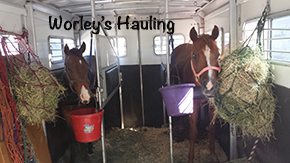 like a bargain may really be less than it appears, so shop wisely. The first thing you need to consider is if you want a legal hauler or somebody who just hung a shingle to help pay for their expenses when they are delivering a horse they sold, or coming or going from a show or that big fancy trailer they have a loan on. The trick is to find a legal hauler who is also good horseman. You can do your own homework on whether a hauler is legal but you will have to rely on references and recommendations to determine if they are experienced and good with animals. You also need to compare apples to apples. A legal hauler will cost more in most cases as they must have commercial insurance and must keep their rig up to DOT standards as they are regularly inspected. A legal hauler must abide by hours of service regulations. Some haulers use stock trailers and some use 15 horse vans and then there is everything in between. Ask for photographs of the interior or exterior of the truck and trailer. Some stop at night. Some drive straight through. Some offer unnecessary services like aromatherapy. Ask lots of questions. A totally legal hauler will have both a DOT number and an MC number. The MC number is critical. They must have that number to legally haul commercially. They also must provide proof of commercial insurance to keep this number. Many haulers state they are DOT compliant but they only have a “Private” or “Exempt” designation. They cannot legally haul for compensation and the only insurance they carry is private insurance on their rig and not commercial insurance. Many people will name their company even though they are not a legal transport company as most people are trusting and will not check up on the company. Make sure that the number matches the person you are contracting with. Some illegal haulers will provide you with a fake DOT number or use a DOT number for a company with a similar name but the location will be different and they may not be designated as hauling livestock. Note how many drivers they are approved for. If the person/company named on the DOT application is not the person who will be doing the haul make sure that the number matches the person you are contracting with, If the name does not match they need their own DOT number. If you are provided with a DOT number look it up on this website:
like a bargain may really be less than it appears, so shop wisely. The first thing you need to consider is if you want a legal hauler or somebody who just hung a shingle to help pay for their expenses when they are delivering a horse they sold, or coming or going from a show or that big fancy trailer they have a loan on. The trick is to find a legal hauler who is also good horseman. You can do your own homework on whether a hauler is legal but you will have to rely on references and recommendations to determine if they are experienced and good with animals. You also need to compare apples to apples. A legal hauler will cost more in most cases as they must have commercial insurance and must keep their rig up to DOT standards as they are regularly inspected. A legal hauler must abide by hours of service regulations. Some haulers use stock trailers and some use 15 horse vans and then there is everything in between. Ask for photographs of the interior or exterior of the truck and trailer. Some stop at night. Some drive straight through. Some offer unnecessary services like aromatherapy. Ask lots of questions. A totally legal hauler will have both a DOT number and an MC number. The MC number is critical. They must have that number to legally haul commercially. They also must provide proof of commercial insurance to keep this number. Many haulers state they are DOT compliant but they only have a “Private” or “Exempt” designation. They cannot legally haul for compensation and the only insurance they carry is private insurance on their rig and not commercial insurance. Many people will name their company even though they are not a legal transport company as most people are trusting and will not check up on the company. Make sure that the number matches the person you are contracting with. Some illegal haulers will provide you with a fake DOT number or use a DOT number for a company with a similar name but the location will be different and they may not be designated as hauling livestock. Note how many drivers they are approved for. If the person/company named on the DOT application is not the person who will be doing the haul make sure that the number matches the person you are contracting with, If the name does not match they need their own DOT number. If you are provided with a DOT number look it up on this website:
http://safer.fmcsa.dot.gov/CompanySnapshot.aspx Make sure that it says they are Authorized for Property under Operating Status. If it says Out of Service they are not currently legal. Also if the number does not come up it may be inactive. Anything besides Authorized for Property is not legal. You can also check on their insurance status on this webpage. Other red flags may include no website. A website with no address so that you don’t know where to reach them if there are issues that need legal assistance such as accident during transport. A photograph of their rig that does not have a sign on the door with the name of the company and DOT number (required by law). If they do not ask for a deposit be suspicious. This means that if another better paying job comes along you may be dumped like a hot potato. Also, only pay a deposit by PayPal or credit card as this is the only way you are guaranteed of getting your money back if the company does not perform. Do not send cash, money orders, western union or payment by debit card as you may never see it again if they do not show up or something happens to your horse. Be suspicious if they are slow to respond to telephone calls. Once you have made contact with a company you are interested in by email or private message follow up by telephone to see how responsive they are to you. Ask for their company policies regarding overnights, rests, offloading, watering, feeding, etc. Do not tell them what you want. Make them tell you how they do it otherwise they will just tell you what you want to hear. Keep in mind that if they are driving with a pick up truck they MUST stop at night for ten hours even if there are two drivers as the DOT does not consider a pick up truck to have a sleeper berth and they are not allowed to be in the trailer when it is moving so if they are not laying over at night at a horse motel that means if they do stop at all the horse is standing on the trailer. You can usually get clues from a website as to how long a company has been in business. The dates of the references, the number of references, number of visits to the website, some websites will have a creation date somewhere. If their website is combined with a boarding stable, show barn, training facility, breeding facility, etc. there is a good chance that hauling is not their first priority so you may experience cancellations or delays until they are ready to travel with horses of their own. Many haulers will tell you what you want to hear regarding timing, dates, etc. just to book the job. Many will put words in their ads like “DOT compliant” or “fully insured” to throw you off. That may technically be the truth because they may have a DOT number that is private or exempt and anyone who has a vehicle on the road is required to carry insurance. Illegal haulers refer each other and they post things about legalities to throw you off and make them think they are legal. I’m sure there are a lot of things I have forgotten but this will get you started in a search for a competent, legal transport company who is also a great horseman.
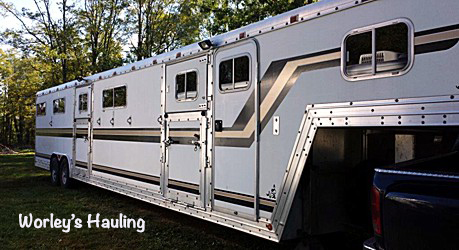 |
CH:
What type of equipment do you run? And why did you choose it?
Mari Worley:
Our primary rig is a 2013 Dodge Ram 3500 diesel dually pulling a Featherlite 7 horse head to head trailer. We have several back up trucks and another Trail-Et head to head trailer.
Matthew Redding:
GMC Sierra Duramax/ Hawk 4 horse head to head trailer. { We chose } head to head in order to accommodate box stalls and ability to take off horses in orders other than the order they're loaded.
Mari Worley:
We chose to stay small as we want to offer personalized service and not have to travel all over the country to get the horses delivered. We use a pick up truck because it can get into more locations without issues, typically gets better fuel efficiency than a tractor, can usually be repaired at more places and at a lower cost and is less costly to replace. We choose to use head to head trailers because you never have to unload a horse to take another horse off the trailer which is much safer than trying to offload and tie one or more horses to get a horse deeper in the trailer on a slant. You never know what the situation will be when you get to a delivery. If you cannot access the property you may be offloading on the side of the road. Horses traveling in a head to head trailer never have to be backed off the trailer which we feel is safer. Some horses also prefer to ride backwards. We can also take care of the horses from inside the trailer and we can see their entire body to observe their condition. It is easy to refill hay bags and water buckets in a head to head trailer. Our trailer has doors on both sides and the rear and we have the option of a ramp or a step up. We chose solid floor to ceiling dividers because we haul everything from miniature horses to draft horses and they each need their own private space without invasion by other horses. We have both chest bars or solid fronts for miniature horse or other small animals. We can create single, double or full box stalls in the head to head trailer.
CH:
What is your best advice to someone if they are purchasing a horse trailer?
Matthew Redding:
Do not sacrifice quality for price.
Mari Worley:
Before I would advise someone about purchasing a horse trailer I would need to know the breed of animal they would be transporting, how often they expected to transport, where they would be transporting to i.e. trail rides, shows, or a professional hauler, what they planned to pull it with and what their budget is. There is no one size fits all. Some people prefer bumper pull and some prefer goosenecks. Some prefer slant loads and some prefer head to heads or even stock trailers. I would never recommend a particular brand of trailer as there are many good trailer manufacturers out there but the potential purchaser must be able to answer all these questions before they start shopping for a trailer.
CH:
When you arrive and a horse won’t load how do you handle it, esp. if other horses already on board?
Mari Worley:
Patience is the key. There is also no one answer to this question. Each horse is different and there are different ways that they refuse to load. You must observe why the horse is not loading and then have the knowledge to take steps, with patience, to encourage the horse to load. The key is to make them want to be on the trailer more than they want to be out of the trailer. I cannot remember a time when we left a horse because it would not load.
Matthew Redding:
We call the owner or buyer. We charge for every half hour after the first so it is their choice whether to stay and load or not take the horse. But shipping balance is due.
CH:
Approximately how much should someone expect to pay to go from New England to FL?
Matthew Redding:
$1200
Mari Worley:
This is another loaded question. There is no set answer even with the same company. The first criteria is mileage. The route has to be considered including if there are roads with tolls which are common in both New England and Florida. The cost of fuel at the time of booking is a factor so we need to know the average cost of fuel along the route we would be taking. Another factor would be the size stall that the client wants. Obviously, the larger the stall, the higher the cost per mile. Does the horse have special needs such as medications that need to be administered, a special diet such as pellets that need to be soaked or a foal needing to be bottle fed every few hours? Does the client expect special services? Do they want a private trip? Do they have more than one horse? Do they expect pick up and delivery within a limited timeframe such as during daylight hours only? Each trip we provide a quote for takes all these factors into consideration. When a client is soliciting quotes they should ask enough questions to determine if they are comparing the same things as all haulers have different equipment and offer different services. Some haulers who are not legal may be able to offer lower prices as their overhead is not as high. Some haulers may be able to offer lower prices as they have just one space left on the trailer. Some haulers may be able to offer lower prices because their equipment is paid for so they don’t have the expense of a loan.
CH:
Do you offer discounts if they book you both ways?
Mari Worley:
We do not generally offer round trip transport because we generally are traveling coast to coast and have other clients’ horses on board so we cannot just turn around until all the horses have been offloaded. We do offer multiple horse discounts for horses traveling together to and from the same location. We also offer discounts to horses coming to or from a 501c3 facility and to active military families.
Matthew Redding:
Yes.
CH:
What made you decide to enter the world of horse transport?
Matthew Redding:
To see the country, work with horses daily, be my own boss, and support my family.
Mari Worley:
That is a long story best saved for when you have a lot of time to listen. But, we literally fell into the job and continued to do it because we love animals, we love to travel, we love owning our own business and we love meeting people. Its great to have a career doing something you really enjoy.
I hope that these answer helped you, our valued reader, feel more confident and empowered when booking horse transport. We all value our horses so much, emotionally and financially too, that making a decision to entrust them to somebody else’s care is not easy. There is some wonderful advice here and we thank both Matthew and Mari for their participation. If you would like to contact either/both for a quote please view their information below.
Worley’s Hauling
William and Mari Worley (owners)
3610 NE County Road 0091, Corsicana, TX 75109
Tel: 606-524-HAUL
Website Link http://www.worleyshauling.com
Email: Mari@WorleysHauling.com
MJ Redding Transportation
Matthew Redding (owner)
164 Winter Street, Hopkinton MA 01748
Tel: 508-782-8064
Email: mjreddingtransport@gmail.com
Editor’s Note: Check out this article kindly reprinted here with permission from ourselves! A view on horse transport from a professional international freight forwarding and international dressage competitor.

